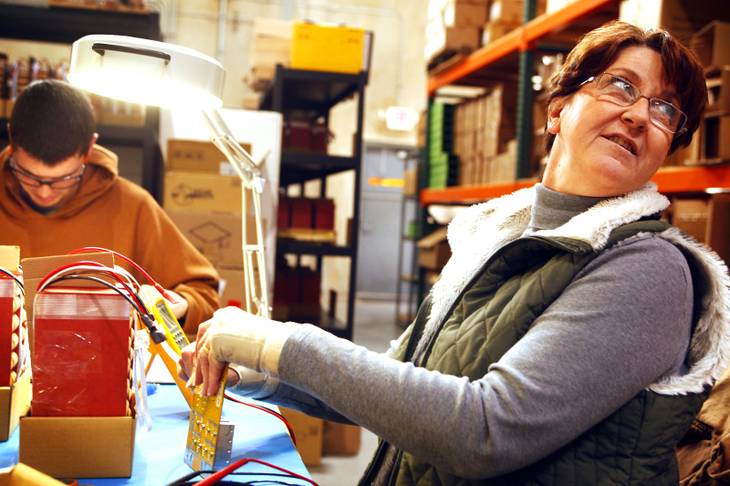With Nevada looking to diversify its economy, a group of little-known companies appears to hold promise in the field of rechargeable lithium batteries.
One such company, K2 Energy Solutions Inc., of Henderson, has gained regional and national attention in recent months.
Late last year, it was named the Technology Business Alliance of Nevada’s Green Tech Company of the Year, and it also landed on the Inc. 500/5,000 list of the fastest-growing companies in the nation, at No. 79.
The private company’s revenue in 2010 was $5.5 million, up from nearly $179,000 in 2007, and it had 49 employees, the Inc. profile of K2 said.
Since publication of the Inc. profile, K2 has disclosed that its revenue grew in 2011 to "well over" $10 million.
''We doubled revenue in 2011 and we expect to double it again this year," CEO Johnnie Stoker said.
The 5-year-old company also turned profitable in 2011, he said, adding the firm wasn’t disclosing any exact numbers on revenue and profit.
"We really have no debt, so everything is being reinvested into our growth," Stoker said, adding employment at the firm has now reached 110 worldwide, including more than 70 in Henderson.
"If we hit our numbers this year, we’ll be up to 100 employees in the United States," he said.
"We had a good profit, I wouldn’t call it a large profit," he added.
Another company with Nevada operations in the specialty battery field is Valence Technology Inc. of Austin, Texas. It has about 10 Las Vegas-area employees in its legal and engineering operations.
K2 and Valence share a heritage. Valence moved its headquarters from San Jose, Calif., to Henderson in 1995 because of the lower costs to do business in Nevada.
By 2001 its headquarters had moved to Austin because that’s where a new CEO lived. K2, in the meantime, was formed in 2006 by a group of battery scientists and executives — including some from Valence — who wanted to own their own company.
A third company in the lithium battery industry, Altair Nanotechnologies Inc., of Reno, employs about 80 people.
All the companies manufacture or plan to manufacture advanced lithium battery cells in China, an industry practice tied to lower labor costs in that nation.
The cells can be used in most any product associated with mainstream, nonlithium batteries in applications ranging from cars to cameras and flashlights. Lithium is known for its light weight, its ability to store more power than traditional battery materials and its ability to withstand temperature fluctuations.
K2 does some assembly of its Chinese-made cells into battery packs and modules at its Henderson plant.
Stoker said K2 batteries were being used in a variety of applications, including portable medical carts used by hospitals, utility trucks with booms and equipment operating on batteries rather than power generated by idling engines while parked, classified U.S. Defense Department products, backup energy storage applications for buildings and energy grids, and in a few specialty vehicles.
Business is so good that K2 is building a new $24 million plant in China so it can manufacture its own cells — they’re manufactured there on a contract basis currently.
Three to five years down the road, if K2 can find financing, it hopes to build a $60 million plant in Henderson that would make cells and employ some 150 people.
Stoker said that as plants become more automated, the Chinese labor cost advantage was less important. That’s why it would make sense to build a cell plant in the U.S., he said.
Such a plant would be closer to some of K2’s customers, he said, and would appeal to a significant customer — the U.S. military.
"Those guys in particular want manufacturing in the United States for security reasons,'' Stoker said.
Stoker said there were some key factors that could help drive the development of an industry cluster in Nevada.
One is that Nevada has a growing solar energy industry, which needs specialty batteries to stabilize the output of its power grids on cloudy days. Another is that there is a good pool of idled electrical technicians looking for work in the area.
''You have the gaming industry that uses all sorts of circuits and circuit boards and electronics. And that’s a key to building the battery packs. Our electrical engineering team is basically people laid off from the gaming industry the last three years," Stoker said.
Can he imagine K2 someday providing batteries by the millions to the production lines of Ford, General Motors, Chrysler and other automakers — a market now dominated by big Fortune 500-type battery makers?
"That’s why we’re here," he said. "Our plan is to go public and continue to grow. The technology is there. It’s really getting the financial and business resources behind us and then growing smart."
